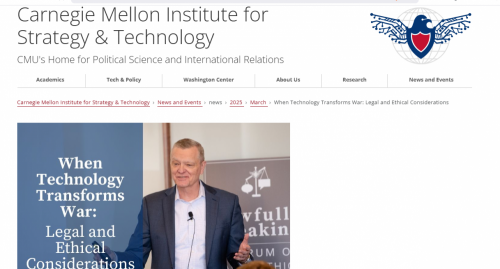
By Aleksaundra Handrinos
https://www.cmu.edu/cmist/news-events/news/2025/march/when-technology-tr...
MEDIA:Lindsay Marcellus

March 28, 2025
When Technology Transforms War: Legal and Ethical Considerations
CMIST’s Lawfully Speaking Series Welcomes William Renn Gade
By Aleksaundra Handrinos
Rapidly developing new technologies such as drones, lethal autonomous weapon systems, and artificial intelligence are creating a modern revolution in military affairs that poses legal and ethical questions about warfare.
So said William Renn Gade, deputy general counsel for intelligence and security with the Department of Defense, when he recently explored the impact of technological advancements on the law of warfare as part of the “Lawfully Speaking: A Forum on Law & Ethics” series hosted by the Carnegie Mellon Institute for Strategy and Technology (CMIST).
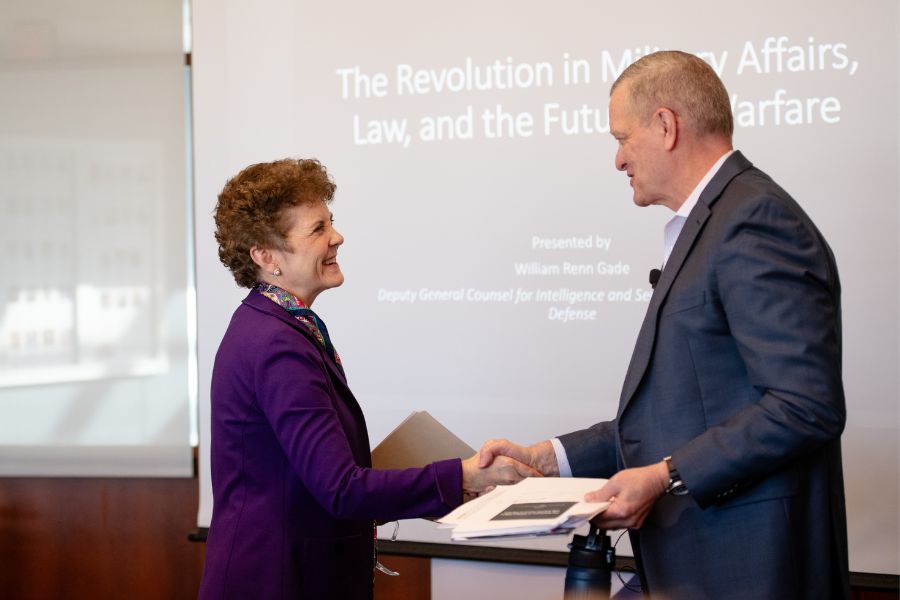
Warfare today has moved beyond the steel, gunpowder, rifled muskets, and traditional battlefields of the past into a world of artificial intelligence (AI) and space. For this reason, Gade offers legal guidance to senior leaders on intelligence, cyber, space, sensitive activities, security, AI, and advanced technology. A former Army officer, he also has served as general counsel for the Defense Intelligence Agency and as senior legal counsel at the National Counterterrorism Center and the Office of the National Counterintelligence Executive.
He defines the revolution in military affairs as “the acceleration of evolutionary technological change combined with associated operational and organizational transformation that altered the character of war.” For example, drones and thermal imagery have created stronger, more complex security strategies. There is a need to reexamine the legal aspects of conducting hostilities—such as positive law, the expression of which includes treaties, and customary international law, which is developed through state practice and then accepted as legally binding. To establish international humanitarian law, states typically need a stimulus like war to provoke a response.

Developments in national defense space architecture reveal significant changes in surveillance, communication, and processing ability, he said. These new capabilities bring new legal challenges that include the lack of a commonly accepted definition and delimitation of space. Maritime law is often used as a comparison, but the regulation of space does not have the same lengthy history or breadth of norms. Existing frameworks, such as the Outer Space Treaty, the Artemis Accords, and application of international law offer some guidance for regulating space, yet gaps persist. Lingering legal considerations include access to the coveted orbital slots above the equator or spaces for satellites in orbit around the Earth, as well as the potential for immense destruction if Russia were to orbit the nuclear weapons U.S. officials claim they are developing.
Warfare developments bring a particular need to ensure responsible AI. Considerations include risk tiering with identification of inaccurate or poisoned AI outputs, as well as the protection of privacy and civil liberties. Knowing the origin and integrity of training data is vital, Gade stressed.

Principles of the law of armed conflict can apply to AI, he said. Current law has voids such as the binary conceptualizations of war and peace and of combatant and noncombatant. Gade cited the IT Army of Ukraine as an example. This volunteer organization crowdsources cyber warfare to help Ukraine in its war with Russia. These individuals’ demarcation as combatants or noncombatants is ambiguous due to factors such as their location across the world and volunteer status. Gade posits the effects of Ukraine’s approach to the war as “democratization of information warfare and irregular warfare … and [it] is much harder to cabin than just that combatant-noncombatant methodology.”
Following his lecture, Gade joined CMIST Director Audrey Kurth Cronin for further discussion, which touched on the dangers of space-based nuclear weapons such as unprotected satellites, severed communications, and food shortages, as well as the historical trend of humanitarian law evolving to address changes in warfare technology. When asked about accountability for autonomous drone errors, he stressed the situational dependency and lack of an universal answer. He later acknowledged forecasters’ limitations, noting, “We are perfectly imperfect predictors,” but offered attendees insights into projected future interactions between warfare developments and the law. It may be difficult to make predictions, he said, but the ethical and legal issues posed by emerging technologies are nonetheless critical and require careful thought, ongoing legal interpretation, adaptation, and international discussion.
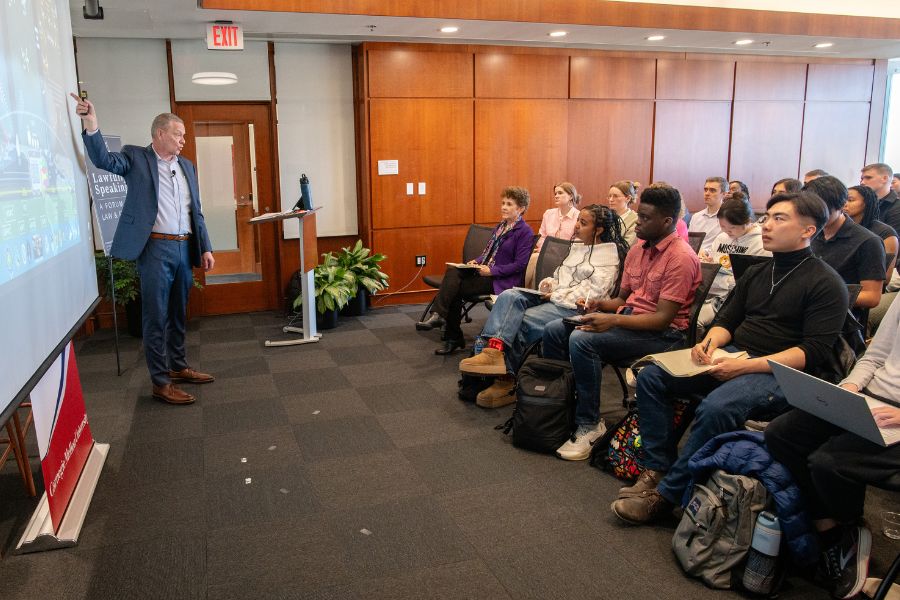
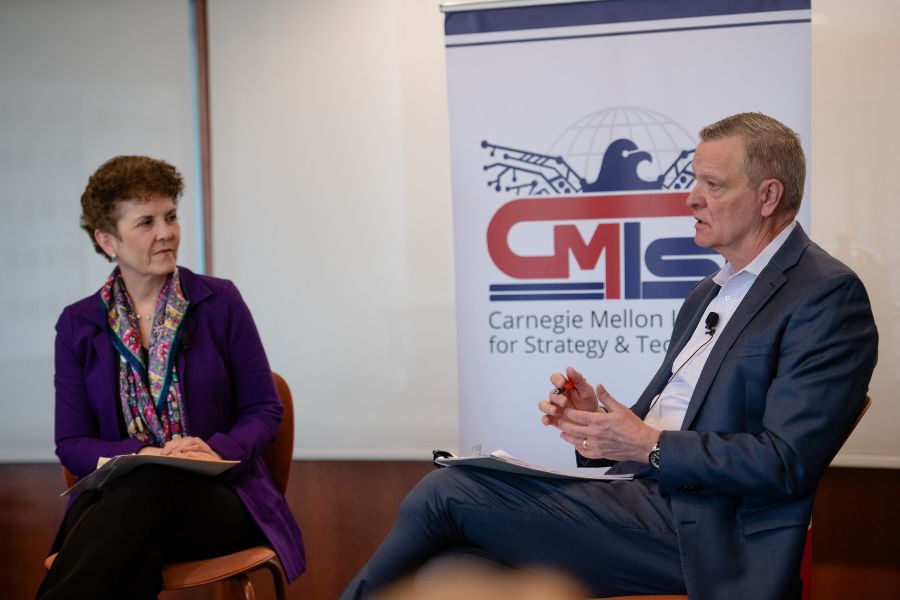

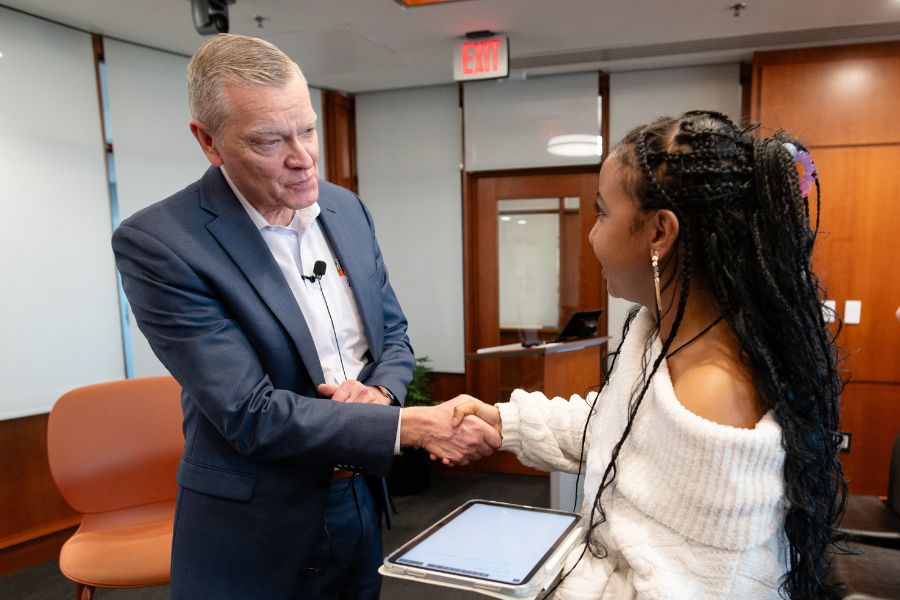
(Image 1, CMIST Director Audrey Kurth Cronin greets William Renn Gade, deputy general counsel for intelligence and security with the Department of Defense; Images 2-3, William Renn Gade gives a lecture through CMIST’s Lawfully Speaking series; Image 4, Gade explores the impact of technological advancements on the law of warfare; Image 5, Gade joins Cronin for further discussion on the dangers of space-based nuclear weapons; Image 6, Following the lecture, audience members asked questions; Image 7, Students had the opportunity to meet Mr. Gade after the event ).
ABOUT

The Carnegie Mellon Institute for Strategy & Technology (CMIST) is a new academic and research initiative launched in 2023 by Carnegie Mellon University (CMU). The home for political science and international relations at CMU, CMIST is poised to be a thought leader in global and national security issues, policies, and strategies related to digital technologies. This university-wide initiative is devoted to the wise development, use, and governance of new and emerging technologies. CMIST is a Team of Teams that draws from CMU’s cutting-edge research in machine learning, cybersecurity, robotics, big data, neuroscience, human-computer interaction, human enhancement, and AI. Our team of social scientists work to provide cross-cutting analyses of the political, ethical, social, and economic impacts of these emerging technologies. Our researchers take an entrepreneurial problem-solving approach to reducing the risks and maximizing the opportunities of emerging technologies in war and peace, ultimately shaping how digital technologies are changing national and international security.









